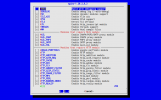Hi all,
I haven't been yet in the situation where I had to install from ports or build any packages, until now
In this case, I simply wanted to install www/nginx-full in a jail, as a reverse proxy with the
I already have checked ports-mgmt/poudriere and ports-mgmt/synth, but I wanted to ask for advice about the best way to build/install this port and manage the future updates.
Thanks in advance
S-
I haven't been yet in the situation where I had to install from ports or build any packages, until now
In this case, I simply wanted to install www/nginx-full in a jail, as a reverse proxy with the
--with-mail option.I already have checked ports-mgmt/poudriere and ports-mgmt/synth, but I wanted to ask for advice about the best way to build/install this port and manage the future updates.
Thanks in advance
S-


